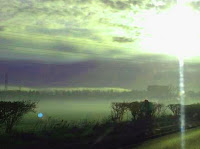AUNT MABEL’S EASTER SURPRISE
Richard Banks
Aunt Mabel was an elderly lady of ample proportions who no matter the occasion was always to be seen in what my father described as her widow's weeds. Having once come to our house with a bunch of daffodils for my mother I assumed that these must be the weeds to which my father referred but when the expression continued to be used, flowers or no flowers, I eventually tumbled to the fact that he was referring to the unrelenting blackness of her attire. To me she resembled a black cloud and as her visits to us twice coincided with heavy downpours of rain I became convinced that Aunt Mabel and rainy days were never far apart.
My aunt being a widow was easier to understand. She had been married briefly to a man named Bert who was killed in WW1 forty-one years to the day before I was born. My birthdays were therefore a reminder to her of a tragedy from which she never really recovered. It is said that at my christening she shed enough tears to fill the font.
She was, of course, my Great Aunt who
was usually invited to family gatherings that also included her brother, my
paternal grandfather, but after he died her visits became less frequent due,
partly, to her moving into residential care. Although she was still reasonably
mobile and clear in her thoughts and conversation my father’s acquisition of
his first car, a Hillman Minx, made it more convenient for us to visit her
rather than the other way around. This we did with great regularity, four times
a year, our visits seldom lasting more than an hour although to me, deprived of
my playthings, they seemed a good deal longer. Nevertheless my presence did on
occasions provide her with a certain melancholy pleasure for she had begun to
perceive in my appearance a resemblance to her late husband. Indeed I so raised
her spirits that her usual expression of sad resignation sometimes gave way to
a smile that also brought an unexpected gleam to her dark brown eyes.
It was in the early Spring of 1968 that
my father declared that our first visit of the year to Aunt Mabel was to take
place on Easter Sunday but that it was not to include me. I was still
recovering from the measles and although no longer infectious was not, due to
my remaining spots, allowed out beyond our back garden. I was, therefore, left
in the care of my fourteen year old sister who, once my parents were gone,
disappeared into her bedroom to play records. This was fine by me and I set-out
my soldiers on the living room floor confident that the ensuing battle would
not be disrupted by the intrusion of unwanted feet.
I was nearing the conclusion of the
Battle of Little Big Horn when I became aware of an interested spectator in the
form of Aunt Mabel. As she had not rung the front door bell she must, I
thought, have gained entry to the house through the side door which in those
days was closed but never locked until evening. She regarded me with a smile
that by the standard of her past sad glimmerings was almost radiant.
“Have the soldiers won?” she asked.
I explained that this was Custer’s last
stand and that he and the seventh cavalry were soon to be wiped out by the
Her eyes twinkled with amusement.
“Then, Harry, it’s just as well I came when I did. I tell you what, let them
have a truce for awhile, I have something to tell you. Come on now, sit down
next to me on the settee. It won’t take long and as it involves the giving of a
present I’m sure you’ll find it time well spent. And if Mr Custer has his wits
about him he might very well slip away unnoticed.”
I was about to explain that the battle
actually happened and that there was nothing I could do to save Custer and his
men when I noticed that she was reaching into her handbag presumably for the
gift she had mentioned. A moment later the battle was all but forgotten by the
sight of a yellow tin bearing the words, ‘Colman’s Mustard’. My face must have
registered both surprise and puzzlement although as I was behind it only Aunt
Mabel would have known this for sure.
Don’t worry,” she whispered, “there may
be something different inside. Shall we see?”
I nodded vigorously and through
unblinking eyes watched as she lifted the lid to reveal some crepe paper
within.
“Oh dear,” exclaimed Aunt Mabel, “I
hope there’s more than paper in there.”
For the first time, I realised I was
being teased and that Aunt Mabel had a sense of humour that was as mischievous
as it was unexpected.
“Go on reach inside, see what you can
find, but be gentle it’s very precious.”
I inserted the fingers of both hands
and almost immediately felt the smooth, cool object within. I raised it up and
having discarded the paper still clinging to it saw an enamel egg. I
should have been disappointed - after
all what use was an enamel egg to a boy who spent most of his spare time
playing soldiers or football - but I wasn’t, far from it, and Aunt Mabel
observed my reaction with evident satisfaction. She had judged me well. I had a
soul that, despite my childhood obsessions, could be touched by the alluring appeal
of fine art, and that egg was, without doubt, the most beautiful object I had
ever seen.
“Let me tell you about it,” she said.
“Have you heard of Peter Carl Faberge?”
I shook my head.
“Well, he was a very gifted craftsman,
a jeweller and goldsmith, who made all sorts of lovely things for the Czar of
Russia and other royal people. In addition to everything else he did for the
Czar, each Easter he would make him an egg, like this one, which he decorated
with gold, silver and precious stones. They are wonderful works of art that if
sold today would cost the buyer many, many thousands of pounds. Yes, you may
well open your mouth in disbelief. However, I mustn’t raise your hopes too
high, this is not a Faberge, but it’s the next best thing. This was made by one
of his pupils, who in 1912 set up his own studio in
“Is that the Uncle Bert who was killed
in the war?”
“Yes dear, he was my husband, although
not for very long. We married in 1916 just before he left this country to fight
the Germans on the western front. We should have waited until the end of the
war which was only two years later but we weren’t to know that at the time. We
were young and in love and in far too much of a hurry to wait. We honeymooned
in
“And that’s when he gave you this egg,”
I said, anticipating her next line. “It must have cost him an awful lot of
money.”
“Well, not quite, but it did cost him
his tobacco allowance for two weeks and for someone who loved his pipe as much
as he did that was a high price to pay. You’re looking puzzled, dear boy. Let
me explain. Your great uncle was allowed a quantity of tobacco each day which
he gave to another soldier in exchange
for the egg. How the soldier came to be in possession of it is a mystery we
will probably never have the answer to, but in war, many things are lost and
found, or more likely looted from damaged houses.”
“The thought that I might be in
possession of stolen property, at last, became too much for me and, several years
after the ending of the war, I took the egg to the
“I should have been happy, sold it at
auction and used the money to buy myself an annuity that would have provided me
with an income for life, but I didn’t. A pity, especially as Bert would no
doubt have wanted me to do so. Instead, I kept it on my dressing room table as
if it was a religious relic. You see, I couldn’t bear to be parted from it.
Indeed in my depressed state of mind, it would have seemed like a betrayal of
Bert if I had. It was, of course, a huge mistake. Miserable as I was I should
have come out of mourning after a year and made the most of my life, but I
never did. Life became a terrible burden, and only now it is over am I able to
feel the way I once did. Your parents think I’m a dreadful old hindrance; they
have done their duty by me but derived little pleasure from my company. I
hope, Harry, you will think better of me. At least you now have the egg, so
take good care of it. And if anyone tells you it’s not yours tell them that’s
it’s written in my will. Any questions? No? Then I had better be getting along.
I could be leaving by the side door but if you close your eyes and don’t peep I
can be on my way a little more quickly. I have an important engagement in two
minutes time and I don’t want to be late, not after fifty-one years.”
“You mean you’re off to see Uncle
Bert?”
“I think so, dear, I certainly hope so.
Shut your eyes and wish me luck.”
I did. On opening them again I realised
I had not thanked her for her gift, but by then she was gone.
An hour later my parents returned from
the care home with the news that Aunt Mabel was, in my mother’s words, ‘passed
over’. By then I had finished the
I said nothing about Aunt Mabel doing some of her ‘passing’ by way of our house - they would never have believed me. As for the egg I kept quiet about that too until the reading of her will when I said that she had already given it to me during one of our visits to the care home. As the will said nothing about its likely value and I was equally reticent on that subject my parents assumed that it was an inexpensive bauble which, after a brief inspection by themselves, was soon forgotten.
Twenty years later I sold the egg to the V&A for a good deal less than it was worth and invested most of the cash I received in a new Hillman for my father and a house for myself and the girl I was about to marry. If I had any regrets about the sale they were few in number because by then I was an Assistant Curator at the Museum and therefore able to see the egg on any day of the week that I wanted. More importantly it could also be seen by the many thousands of visitors that every year passed through our doors. It was, I thought, both the right and sensible thing to do, and as I have yet to be struck by lightning I can only assume that Aunt Mabel thinks so too.
Copyright Richard Banks









